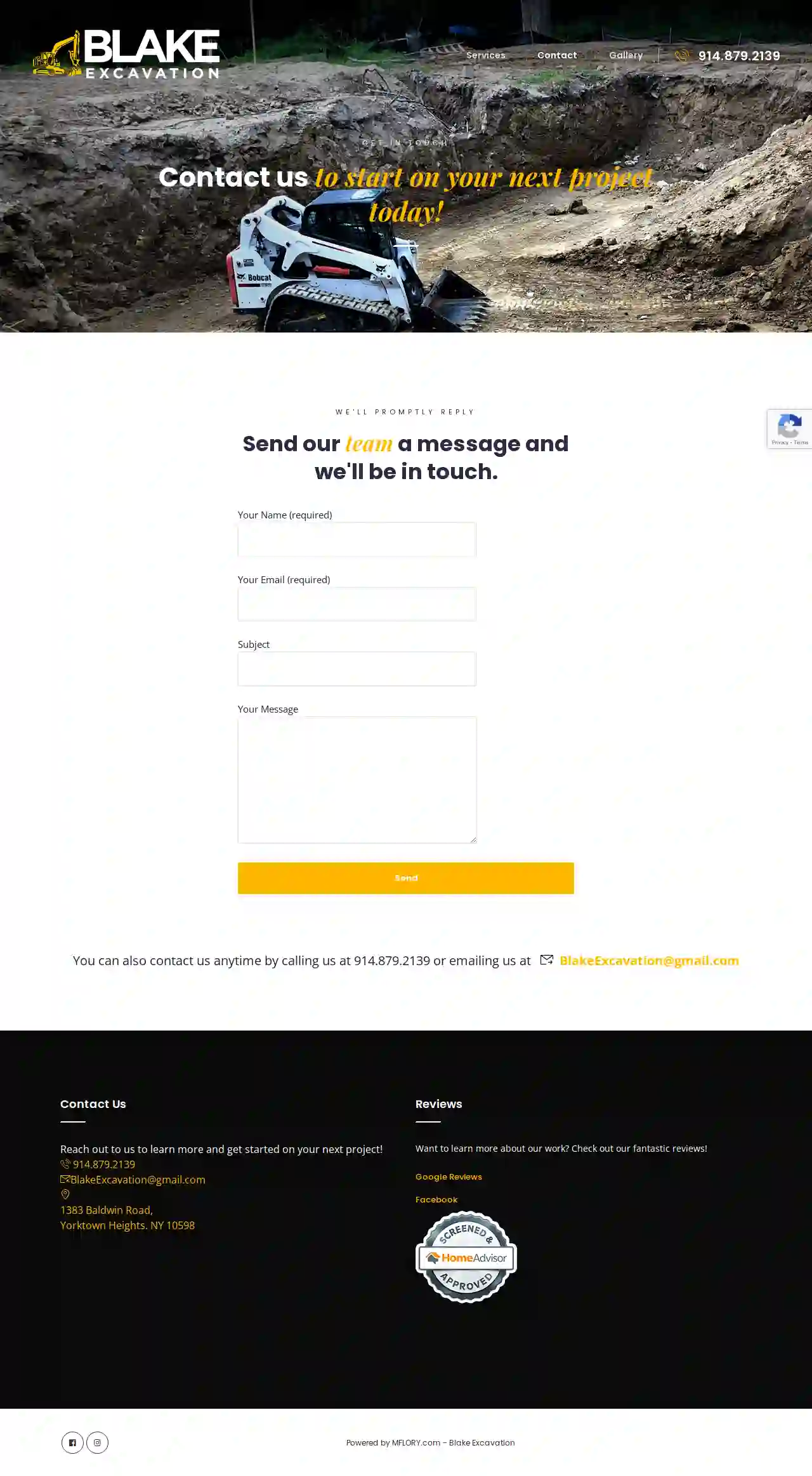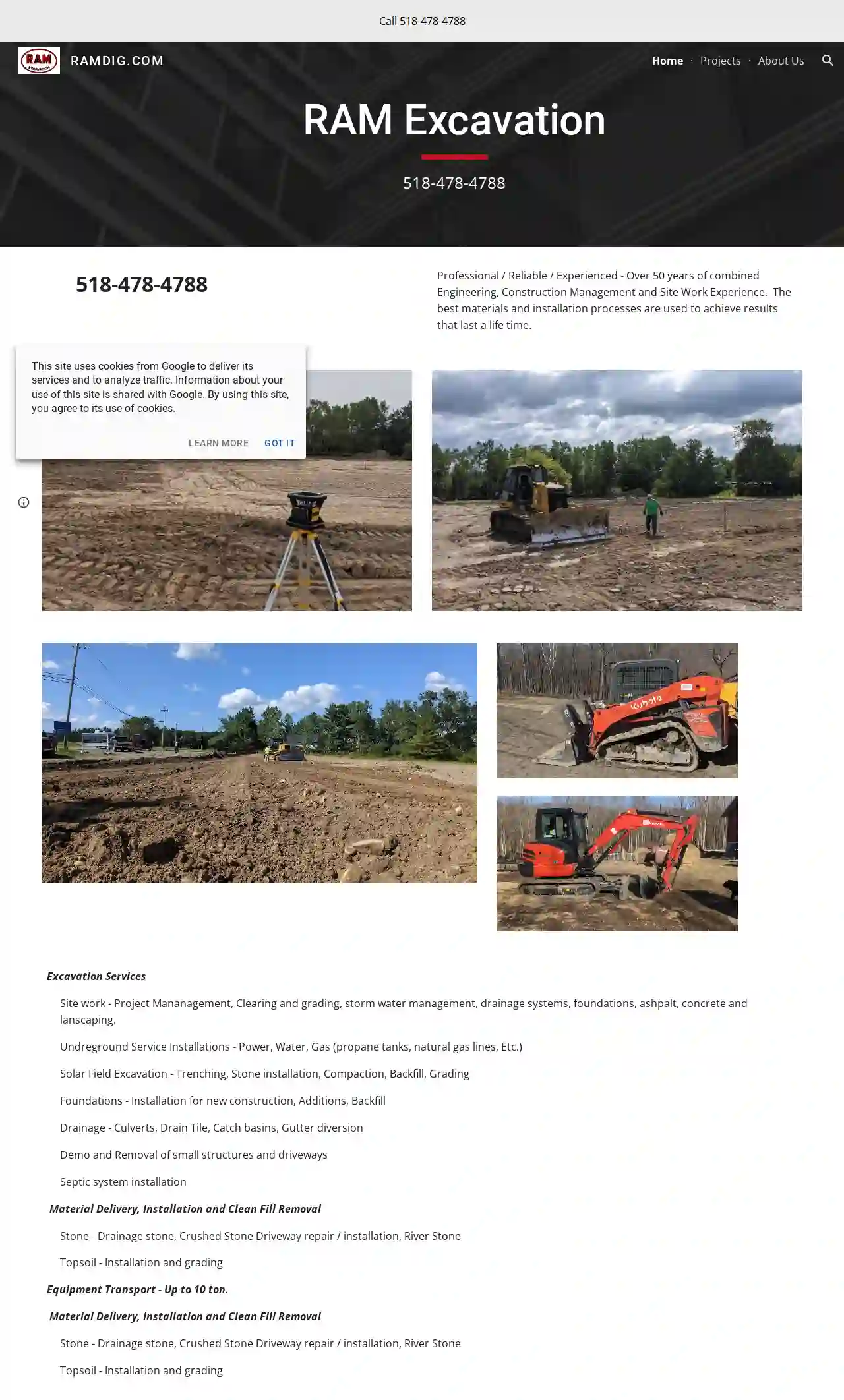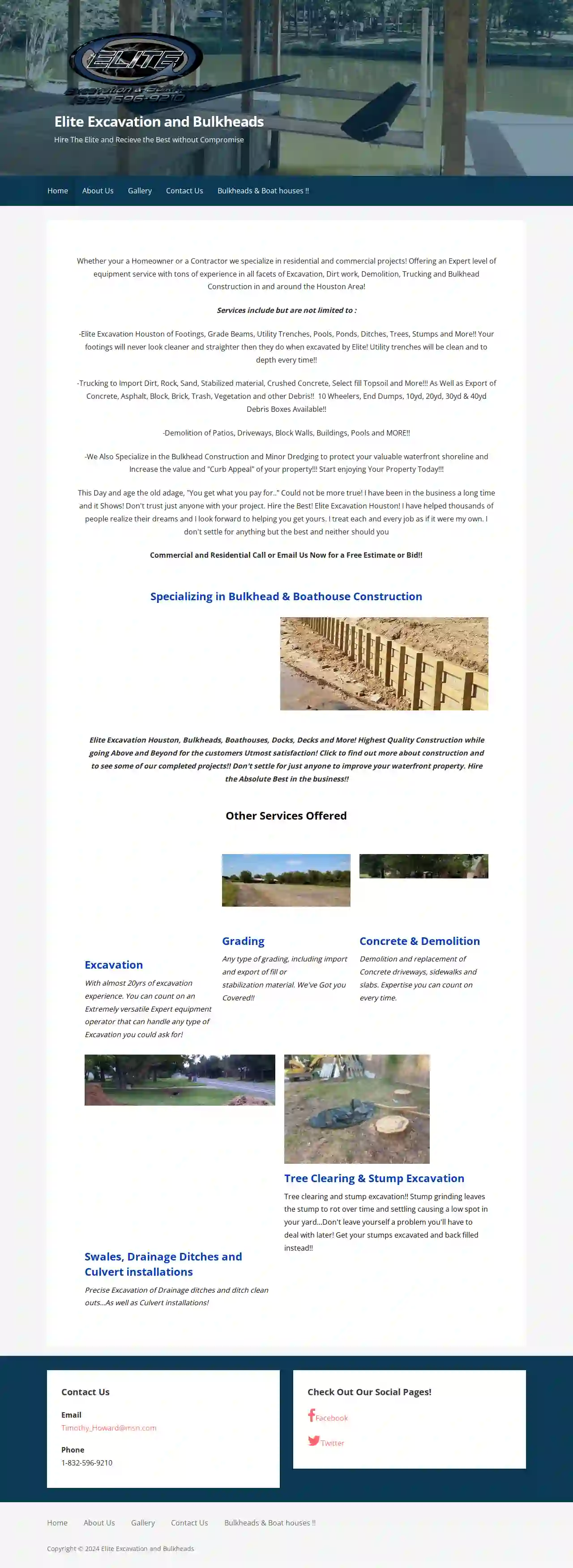Excavation Contractors North Richland Hills
Find top Trenching Services in North Richland Hills
Receive multiple Excavating Contractor quotes for your project today! Compare profiles, reviews, accreditations, portfolio, etc... and choose the best service.

Blake Excavation
511 reviews1383 Baldwin Road, Yorktown Heights, 10598, USAbout Blake Excavation Blake Excavation is a family-owned and operated business with over 25 years of experience in the excavation industry. We are committed to providing high-quality work at fair prices, with the highest levels of customer satisfaction. We are fully licensed and insured, and we are proud to serve the Yorktown Heights, NY community. We specialize in all phases of excavation, from land clearing and site work to foundation installation and retaining walls. We also offer a variety of other services, including: Residential Services: New Home Construction Land Clearing Site Work Retaining Walls Stone Work Septics Drainage Utilities Concrete Slabs Side Walks Curbs Pool installation and pool demolition Home demolition Dumpster Rental Tree Work and Stump Removal Snow plowing Property Maintenance Lawn Care Commercial Services: Land Clearing Site Work Retaining Walls Stone Work Foundation Installation Utilities Concrete Slabs Side Walks Curbs Dumpster Rental We are committed to providing our customers with the highest level of service. We listen to our customers to understand their needs and expectations, and we strive to exceed them at every turn. We offer free estimates and competitive pricing. If you are looking for a reliable and experienced excavation company in Yorktown Heights, NY, contact Blake Excavation today. We would be happy to discuss your project and provide you with a free estimate.
- Services
- Why Us?
- Gallery
Get Quote
Ram Excavation
51 reviewsAllen, USThis is RAM In early 2020 Rick and Mike became RAM. A unique partnership that brings together exceptional project management and true construction grit. This team will deliver for you on your next project, be it a small land clearing job or large site work project. Rick Premo Rick Premo - MBA / MS Mfg Engineering. 28 years of professional experience in management, leadership, engineering and construction. Specializing in project management, ensuring construction projects are completed on time and on budget. Rick received a BS in Manufacturing Engineering 1992 from Boston University and quickly developed a passion for manufacturing and construction management. Rick has a diversified background and has held many positions in the corporate world including Program Management, Plant Manager, Materials Manager, Quality Manager, Senior Product Engineer and Computer Consultant. His expertise is in managing multi-million dollar projects, delivering results to customers and stakeholders. Rick has also had a very diverse career in the private sector. Owning several businesses focusing on construction projects, land development and real estate. Mike Fennel Mike Fennel - Master Electrician. Over 20 Years of construction experience specializing in managing union site work for the Local 236 Electrician's Union. Mike has spent many years "grinding it out" at Global Founderies, building the infrastructure to support the high tech chip manufacturer. Before becoming a partner Ram Excavation, Mike led teams of men on the job site as a General Forman. Each day ensuring that the manpower, materials and coordination so the projects go smoothly. He has been in commercial construction management for 20 years. He has worked multiple building projects from the ground up. Since Mike has ventured into the private space he has maintained his relationship with the Union and in the future plans to provide support to his brothers on the job site. On a personal level Mike is "got your back" kind of guy. Extremely hard working, dependable and reliable. There is no quit in this man...
- Services
- Why Us?
- Our Team
- Gallery
Get Quote
Grant Renne & Sons Inc
4.853 reviews1200 8th Street, Kansas City, 64106, USGrant Renne & Sons Inc. - Protecting Your Biggest Asset Since 1873 Grant Renne & Sons Inc. is a family-owned and operated business that has been serving the Kansas City area for over 150 years. We are the 6th oldest company in Kansas City and have a long history of providing quality foundation repair and waterproofing services. We are committed to providing our customers with the best possible service and value. We are proud to be a part of the Kansas City community and are committed to giving back to the community that has supported us for so many years. We offer a wide range of services to meet your needs, including: Foundation Piering Mudjacking Retaining Walls Tuck Pointing Foundation Releveling Crack Repair Sump Pumps Chimney Piering Waterproofing Exterior Drainage Systems Basement Wall Replacement Bowing Basement Walls We are committed to providing our customers with the highest quality service and value. We use only the best materials and techniques to ensure that your foundation is repaired correctly and that your home is protected from future damage. We are also committed to providing our customers with a positive experience. We are always available to answer your questions and address your concerns. We are confident that you will be satisfied with our services. We are proud to be a part of the Kansas City community and are committed to giving back to the community that has supported us for so many years. We are active members of the Kansas City Chamber of Commerce and the Better Business Bureau. We are also proud to support local charities and organizations.
- Services
- Why Us?
- Testimonials
- Gallery
Get Quote
Cains Construction
524 reviews807 West 30th Terrace, Lawrence, 66046, USCain’s Construction: Your Premier Source of Landscaping and Concrete Services Cain’s Construction is a leading landscaping and hardscaping company serving property owners in the greater Lawrence, KS area. We offer a wide range of services, including gravel driveways, patio installs, excavation projects, retaining wall and drainage services, and demolition services. Our team of professionals is dedicated to providing the highest quality service and ensuring customer satisfaction. We understand that your lawn, landscape, and walkways are the first impression of your home. That's why we're committed to creating beautiful and functional outdoor spaces that will impress your guests and add value to your property. We have the experience, equipment, and knowledge to manage soil and drainage, create retaining walls to protect your property from water damage, and complete any excavation or demolition project you may have. Whether you need a new patio, driveway, or sidewalk, or you're looking to clear your property of unwanted structures, Cain’s Construction is the team to call. We work closely with our clients to ensure that their projects are completed on time and within budget. We're proud to provide friendly service and exceptionally beautiful landscapes. Contact us today to discuss your project and request a free estimate!
- Services
- Why Us?
- Testimonials
- Gallery
Get Quote
Elite Excavation & Bulkheads
55 reviewsHouston, USElite Excavation and Bulkheads: Your Trusted Partner for Excavation, Dirt Work, Demolition, Trucking, and Bulkhead Construction in Houston Elite Excavation Houston is your one-stop shop for all your excavation and construction needs. We specialize in residential and commercial projects, offering expert-level equipment service and extensive experience in all facets of excavation, dirt work, demolition, trucking, and bulkhead construction. Whether you're a homeowner or a contractor, we're here to help you realize your dreams. We understand that your project is important to you, and we treat each job as if it were our own. We don't settle for anything but the best, and neither should you. We're committed to providing our clients with the highest quality construction and exceeding their expectations. We offer a wide range of services, including: Excavation of footings, grade beams, utility trenches, pools, ponds, ditches, trees, stumps, and more. Trucking to import dirt, rock, sand, stabilized material, crushed concrete, select fill topsoil, and more. We also export concrete, asphalt, block, brick, trash, vegetation, and other debris. Demolition of patios, driveways, block walls, buildings, pools, and more. Bulkhead construction and minor dredging to protect your valuable waterfront shoreline and increase the value and curb appeal of your property. We're proud of our reputation for quality workmanship and customer satisfaction. We're committed to providing our clients with the best possible service and exceeding their expectations. Contact us today for a free estimate or bid.
- Services
- Why Us?
- Gallery
Get Quote
Burgess Hauling & Excavating
4.812 reviews14460 Dahlgren Rd, King George, 22485, USAbout Burgess Hauling & Excavating Since its inception in 1974, Burgess Hauling & Excavating, Inc. has built a strong reputation for delivering exceptional workmanship and exceeding customer expectations. We take pride in providing high-quality services at competitive prices. Our commitment to excellence is evident in every project we undertake. At Burgess Hauling & Excavating, we understand that your time is valuable. That's why we strive to complete every job efficiently and effectively, ensuring you receive the results you deserve. We are dedicated to providing our clients with a seamless and positive experience from start to finish.
- Services
- Why Us?
- Gallery
Get Quote
Mosby's Land Management Service
52 reviewsWaco, USAbout Us Mosby's Land Management Service is a professional land management company that has been around since the year 2000. We provide services for both residential and commercial properties. Our services include lawn care, tree trimming, and more. We are dedicated to providing the best service possible to our customers.
- Services
- Why Us?
- Gallery
Get Quote
Choice Land Clearing Waco
58 reviewsWaco, USChoice Land Clearing Waco: Your Trusted Partner for Land Clearing Services Choice Land Clearing Waco is a locally owned and operated family business with over 30 years of experience in the land clearing industry. We are committed to providing high-quality, affordable land clearing services to commercial and residential clients in Waco and the surrounding areas. Our team of experienced professionals is equipped with the latest technology and heavy-duty equipment to handle any land clearing project, no matter the size or complexity. We understand that land clearing is a crucial step in any development project. That's why we take a comprehensive approach, ensuring that all unwanted elements are removed from your land, leaving you with a clean canvas ready for your desired purpose. Our services include: Our Services Land clearing Grading Demolition Tree removal Stump grinding Excavation services Landscaping Retaining walls And much more! We are fully licensed and insured, providing you with peace of mind knowing that your project is in safe hands. Our commitment to quality workmanship and customer satisfaction has earned us an excellent reputation in the Waco area. Contact us today for a free site evaluation and quote. Let us help you transform your land into the vision you have in mind.
- Services
- Why Us?
- Gallery
Get Quote
Shangri-La Springs
4.7259 reviewsShangri-La Springs, Bonita Springs, Florida 34135 USA, 27750 Old 41 Rd, 34135, USOur History The history of the springs begins hundreds of years ago with the Calusa Indians who were the original inhabitants of this area. They used the mineral spring water for medicinal and trading purposes. Then, in the early 1500s, Juan Ponce De Leon discovered the spring in his quest for the Fountain of Youth. Although he never found it, many believed the natural mineral waters running through the spring have special healing properties. This natural mineral spring, which is still flowing on the property today, is the very spring for which the city was named – Bonita Springs. Gilmer Heitman The history of Shangri-La Springs starts in 1921 when Gilmer Heitman, considered to be a visionary of Bonita Springs, constructed The Heitman Hotel with 25 rooms along Heitman Avenue, now known as Old 41 Road. The hotel was built as a place to stay for home buyers during construction of their house. The Heitman Hotel In 1935, the hotel was sold to Robert and Bess DeFoor for $6,000. But the hotel fell on hard times during the depression and the DeFoor’s sold the property to the Haverfields who expanded the hotel to 50 rooms and changed the name to the Bonita Springs Hotel. Walter A. Mack Walter A. Mack, owner Mack Cadillac Corporation in Chicago, then purchased the property and his financial means afforded extensive upgrades. He changed the name to Villa Bonita and added access to a beachfront cabana club on Hickory Island near what we now know as Barefoot Beach. Dr. Charles Gnau The next owner was Dr. Charles Gnau. Dr. Gnau was an osteopath and a believer in the healing powers of the mineral water springs. And it was he who is responsible for the installation of the spring-fed pool with a statue named the Indian Maid of the Springs which is still on the property today. Dr. R.J. Cheatham In 1963, the property was sold to a neuropath, Dr. R .J. Cheatham. Dr. Cheatham changed the name of the hotel to Shangri-La invoking the image of the pathway to paradise as described in the novel Lost Horizon. Under Cheatham’s direction, the hotel became an institute devoted to the practices of natural hygiene. Leo Dahlman In 1993, Leo Dahlman bought the property with the goal of developing Shangri-La Springs into a first class health resort. With a background in historic restoration and hotel management, he restored much of the property to its original grandeur. But, the property fell into foreclosure and became available for purchase in 1998. The Current Owners The current owners, Lama Hana
- Services
- Why Us?
- Gallery
Get Quote
Shilling Excavation, LLC
517 reviews3999 West Moonlight Drive, Robinson, 76706, USShilling Excavation: Your Trusted Partner for Excavation and Land Management in Central Texas Established in 1992, Shilling Excavation has been serving Central Texas with a commitment to quality, efficiency, and client satisfaction. We are a family-owned and operated business, and we take pride in our dedication to providing prompt, courteous, and reliable services. Whether you're a homeowner, general contractor, or ranch owner, we have the expertise and experience to handle your excavation and land management needs. We offer a wide range of services, including: Excavation Services Building Site Preparation Roads and Driveways Clearing Land Clearing Land Grading Services Residential Building Site Preparation Our team is committed to safety, client relations, and timely project completion. We work hard to ensure that your project is completed in a comprehensive, cost-efficient, and safe manner. We also handle commercial projects, specialty, challenging, and custom projects. If you have a unique project in mind, don't hesitate to reach out to us. We'll be happy to discuss your needs and provide a tailored solution. Choose Shilling Excavation for: Professional and experienced land clearing services Reliable and efficient excavation services A trusted and family-owned company A commitment to safety and quality Competitive pricing and free estimates Contact us today to learn more about how we can help you with your next project.
- Services
- Why Us?
- Gallery
Get Quote
Over 22,076+ Excavation Contractors in our network
Our excavation providers operate in North Richland Hills & surrounding areas!
ExcavationHQ has curated and vetted Top Excavation Contractors arround North Richland Hills. Find a top & reliable business today.
Frequently Asked Questions About Excavation Contractors
- Sloped Property: Your property has a significant slope, making it prone to soil erosion or landslides.
- Creating Usable Space: You want to level off a sloped area to create a flat surface for patios, gardens, or other outdoor spaces.
- Preventing Damage: Erosion is threatening existing structures, driveways, or walkways.
- Landscaping Features: You're incorporating tiered gardens, raised beds, or other landscaping elements requiring soil retention.
- Excavations Deeper Than a Certain Depth: This varies by jurisdiction, usually around 5 feet.
- Excavations Near Utilities: Digging near buried utilities (gas, water, electric) often requires permits and utility locates to prevent damage.
- Excavations Affecting Public Property: Projects impacting sidewalks, roads, or other public areas typically require permits.
- Excavations in Environmentally Sensitive Areas: Projects in wetlands, floodplains, or other sensitive areas might need special permits.
- Utility Locates: Contact your utility companies to mark the locations of underground lines before excavation begins. This is usually a free service.
- Hand Digging: Excavate carefully by hand near marked utility lines to avoid damage.
- Potholing: Digging small test holes to expose and verify utility depths and locations.
- Safe Distances: Maintaining a safe distance between excavation equipment and marked utility lines.
- Vacuum Excavation: Using vacuum excavation techniques to expose utilities without digging, reducing the risk of damage.
- Determine the Area: Measure the length and width of the area you want to fill. Multiply them to get the area in square feet (or meters).
- Determine the Depth: Measure the difference between the existing grade and the desired grade (how much you need to raise the ground). This is the depth of fill required.
- Calculate Volume: Multiply the area (step 1) by the depth (step 2) to get the volume in cubic feet (or meters).
- Account for Compaction: Fill dirt compacts when it settles, so add 10% to 25% to the calculated volume to account for compaction. The exact percentage depends on the type of fill material.
How do I know if I need a retaining wall?
Do I need a permit for excavation?
How do you protect utilities during excavation?
How do I calculate how much dirt I need for fill?
How do I know if I need a retaining wall?
- Sloped Property: Your property has a significant slope, making it prone to soil erosion or landslides.
- Creating Usable Space: You want to level off a sloped area to create a flat surface for patios, gardens, or other outdoor spaces.
- Preventing Damage: Erosion is threatening existing structures, driveways, or walkways.
- Landscaping Features: You're incorporating tiered gardens, raised beds, or other landscaping elements requiring soil retention.
Do I need a permit for excavation?
- Excavations Deeper Than a Certain Depth: This varies by jurisdiction, usually around 5 feet.
- Excavations Near Utilities: Digging near buried utilities (gas, water, electric) often requires permits and utility locates to prevent damage.
- Excavations Affecting Public Property: Projects impacting sidewalks, roads, or other public areas typically require permits.
- Excavations in Environmentally Sensitive Areas: Projects in wetlands, floodplains, or other sensitive areas might need special permits.
How do you protect utilities during excavation?
- Utility Locates: Contact your utility companies to mark the locations of underground lines before excavation begins. This is usually a free service.
- Hand Digging: Excavate carefully by hand near marked utility lines to avoid damage.
- Potholing: Digging small test holes to expose and verify utility depths and locations.
- Safe Distances: Maintaining a safe distance between excavation equipment and marked utility lines.
- Vacuum Excavation: Using vacuum excavation techniques to expose utilities without digging, reducing the risk of damage.
How do I calculate how much dirt I need for fill?
- Determine the Area: Measure the length and width of the area you want to fill. Multiply them to get the area in square feet (or meters).
- Determine the Depth: Measure the difference between the existing grade and the desired grade (how much you need to raise the ground). This is the depth of fill required.
- Calculate Volume: Multiply the area (step 1) by the depth (step 2) to get the volume in cubic feet (or meters).
- Account for Compaction: Fill dirt compacts when it settles, so add 10% to 25% to the calculated volume to account for compaction. The exact percentage depends on the type of fill material.